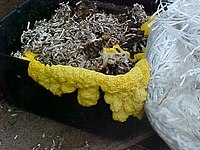
Effects of biodegradable film mulching on bacterial diversity in soils.
Sign Up to like & getrecommendations! Published in 2022 at "Archives of microbiology"
DOI: 10.1007/s00203-022-02799-9
Abstract: The spread of biodegradable plastic films (BDFs) not only increases grain yield but also reduces environmental pollution from plastic film to a large extent. Soil microbes are considered to be involved in biodegradation processes. However,… read more here.
Keywords: diversity; effects biodegradable; biodegradable film; film ... See more keywords

Soil hydro-thermal characteristics, maize yield and water use efficiency as affected by different biodegradable film mulching patterns in a rain-fed semi-arid area of China
Sign Up to like & getrecommendations! Published in 2020 at "Agricultural Water Management"
DOI: 10.1016/j.agwat.2020.106560
Abstract: Abstract The farming practice of fully mulched double ridge-furrow with polyethylene (PE) film has been widely used to improve productivity of many staple crops in arid and semi-arid regions of northwest China. However, the residual… read more here.
Keywords: rain fed; semi arid; water; film mulching ... See more keywords

Fully biodegradable film to boost rainfed maize (Zea mays L.) production in semiarid Kenya: An environmentally friendly perspective
Sign Up to like & getrecommendations! Published in 2020 at "European Journal of Agronomy"
DOI: 10.1016/j.eja.2020.126124
Abstract: Abstract Conventional polyethylene plastic film mulching has been widely used, but its subsequent plastic residue pollution received widespread concern. Fully biodegradable film mulching is viewed as a potential substitution solution, however, it is generally thought… read more here.
Keywords: semiarid kenya; fully biodegradable; plastic film; biodegradable film ... See more keywords

Effect of Microcrystalline Cellulose on the Properties of PBAT/Thermoplastic Starch Biodegradable Film with Chain Extender
Sign Up to like & getrecommendations! Published in 2022 at "Polymers"
DOI: 10.3390/polym14214517
Abstract: Poly (butylene adipate-co-terephthalate) (PBAT) is a fully biodegradable polymer with toughness and ductility. It is usually compounded with thermoplastic starch (TPS) to balance the cost for manufacturing biodegradable films such as disposable plastic bags. However,… read more here.
Keywords: thermoplastic starch; pbat; biodegradable film; mcc ... See more keywords